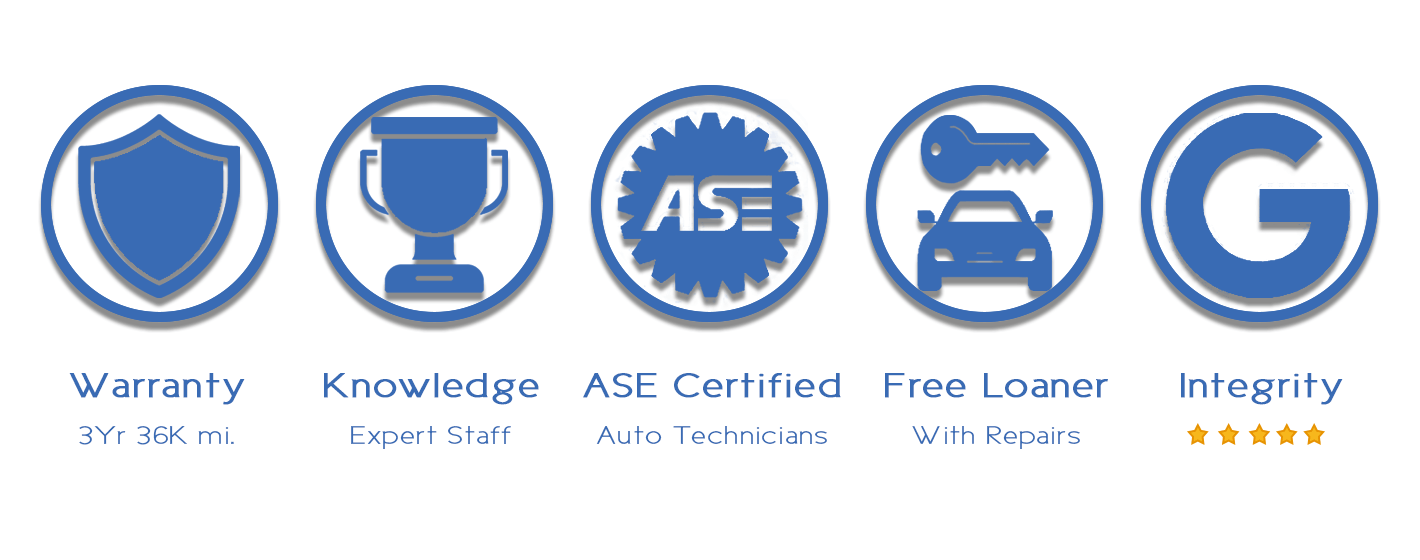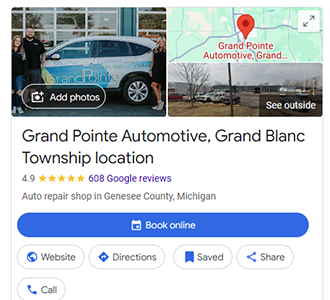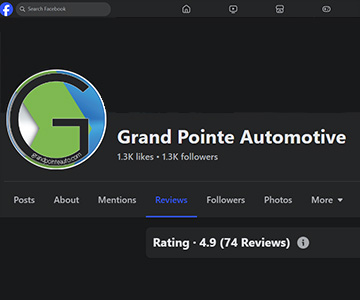Grand Blanc's Own Auto Repair, Grand Pointe
Fluids are vital to keep your vehicle's systems operating smoothly.
Fluids in your vehicle
- Oil
- Brake Fluid
- Power Steering Fluid
- Coolant
- Transmission Fluid
Your Oil level should be checked periodically between oil changes to ensure proper levels. Oil levels that get too low can cause severe damage to your engine. The typical interval between oil changes depends on the vehicle manufacturers recommendations as well as the type of oil you're using in the vehicle. Usually the oil should be changed every 3,000 miles when using conventional oil, and about 5,000 miles if your using synthetic oil. If you often make short trips or drive in stop and go traffic, idle for extended periods, drive in dusty or dirty air conditions, tow a trailer, or drive in cold weather regions, you should stick to the 3,000 mile schedule because you are considered a severe driver according to vehicle manufacturers.
Any automatic transmission fluid, brake fluids, power steering fluid and axles, should use vehicle-specific fluids that the manufacturer recommends.
Coolant should be changed periodically as specified in the owners manual. Any time you have had to add coolant to your system, if it was not the same type of coolant, you should have a flush and refill done as soon as possible. Some different types of coolant should not be mixed. letting mixed coolant go for only a short amount of time can cause it to gel up which will end up causing blockages throughout your cooling system leading to major repairs being needed.
Ask about Fluids!
- What fluids will you be checking?
- Is the oil you're putting in my vehicle the right type for the way I drive?
- Is an oil filter included in the oil change service?
- When should I get my next oil change?
- How often should my fluid levels be checked?
The four main functions of the exhaust: is to control noise, direct exhaust fumes away from passengers, improve the performance of the engine and to improve fuel consumption. Grand Pointe Auto will diagnose repair and replace your vehicles exhaust system.
What is the exhaust system?
Its the metal tubes connected to the engine. There are parts that work together to reduce the noise and the by-products created in during gasoline combustion inside the engine.
The exhaust system consist of:
- A Catalytic Converter: It is the component that sends the gases through a final “burn” to remove leftover exhaust gases.
- A Muffler: This muffles the sounds of the explosions happening inside your engine.
- A Tailpipe: The tailpipe carries the air and water vapor out and away from the vehicle.
Auto Exhaust, should you care about it?
When the exhaust is in proper operation, the gases or "exhaust" created during the fuel combustion process are carried through the muffler and tailpipe. Vehicle exhaust contains carbon monoxide, which can cause headache, nausea, dizziness, and general disorientation in humans. Leaks in the system can allow these dangerous exhaust fumes to leak into the passenger area causing discomfort and possible illness to people riding in the vehicle! Check your exhaust system frequently, if you notice that your car seems to sound different, loud, or suddenly makes a deep rumbling sound when it’s running, this may be a sign of a hole or leak in the exhaust.
Keep your exhaust in good working condition!
Keeping your exhaust system in good shape means fighting its worst enemy: rust. Rust, occurs when the metal parts of your exhaust are exposed to moisture from outside elements like rain and snow, which seems to be quite often in Michigan! If your vehicle is exposed to road salt, have the undercarriage rinsed every few weeks. Salt contributes to corrosion of the metal parts of your car, so removing it regularly will extend the life of your exhaust.
Engine services encompass a wide variety of the repairs that you may need for your car. Symptoms that may indicate engine trouble include:
- Check Engine Light
- Poor Erratic Performance
- Won’t Start
- Stalls
- Oil Leaks
- Major/Minor Tune-Up
- Replace Timing Belt
- Fuel System Testing
- Engine Rebuild/Remanufacture
- Remove & Replace Head Gasket
- Intake Manifold and Gasket replacement
Bring Your Engine to us for a Tune Up!
Tune Ups can go a long way toward increasing the life of your engine as well as decreasing the overall out of pocket expense your vehicle could build up. A well tuned engine gives you the best balance of power and fuel economy. Modern engines can compensate a little for warn parts, and minor running issues giving you the sense that everything is fine. Keeping your engine tuned up will help in the overall efficiency of the engine and emissions system. It will also restore your engine to its original operating state.
Servicing Your Engine Can Save You Big
The EPA says a well-maintained vehicle is more fuel efficient, produces fewer greenhouse gasses, is more reliable and safer.
Typical tune up services intervals can range between 30,000 and 100,000 miles depending on the type of vehicle and the type of spark plugs. During this service you should consider any other ignition system or emissions system parts that may needed or recommended. Remember the investment into your vehicle while everything is still operating properly is very small in comparison to the costs that could ensue, if things are let go and those things end up causing more problems and further repairs. Be sure to also have your fuel and air filters replaced.
The Captain of the Ship / CEO / Our Fearless Leader. Aaron is busier than a one legged man in a butt kicking contest! When he's not too busy he likes...
Brett Klosterman, Master Technician and First Mate of the ship! Brett enjoys saving people! He is a hero Fire Fighter, enjoys...
Randi Klosterman, our number crunching ninja, budget balance-r and all around friendly first lady of Grand Pointe! Randi loves...
As the Financial Officer of our family-run auto repair shop, Courtney keeps the gears turning behind the scenes.
An incredible Service Manager! Derrick is highly knowledgeable in all things auto repair! He is....more
Hayden Ramm, part of Grand Pointe's Service Advisor team. Hayden is knowledgeable, friendly and....more
Bree, one of our Service Advisors helping you understand the garbled tech speak ...
Pressley Holmes, A no non-sense Master Auto Technician, loves getting into his work, literally this guy is covered in grease from head to toe by 8:30 am. Sometimes...
Dennis Densmore, the danger and thrill seeker that spends his time making sure your....
Gavin joined the team while still in high school as an Automotive Technician's assistant and is now well on his way to...
Gil, a Master level Technician focused on one upping every engineer who ever lived! A vibrant Automotive Technician who seamlessly blends the......
Jim is an exceptional parts manager! This guy can find the exact parts needed for any job, he is thorough and works hard to get you the best price on....
Mark Kennedy, Organization King, Friendly Shuttle driver, and an Aviation Buff, if there is anything you want to know about airplanes while Mark is driving you home, I'm sure he will share....
Dan Polzin, Highly skilled Master Mechanic, there's not an inch of engines and vehicles he's unfamiliar with. Dan is our very own Tony Stark...
Nathan Bauman, A graphics and web tech enthusiast. Nathan loves spending time practicing digital arts, admiring cool cars, and...




















